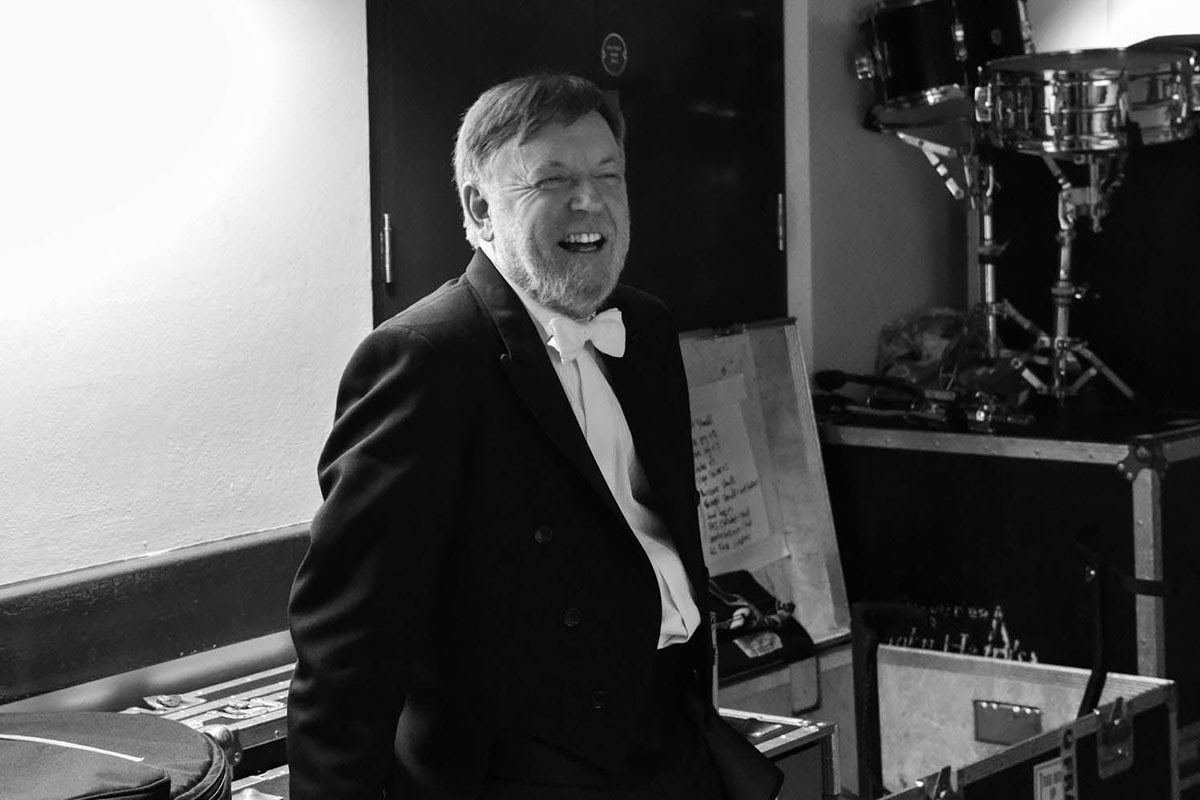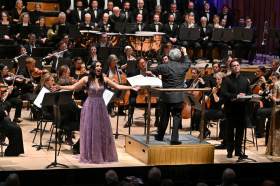Sir Andrew Davis, former Chief Conductor of the Melbourne Symphony Orchestra (MSO) between 2013-2019, died in Chicago on Saturday 20 April after battling leukaemia. He was 80 years old.
Davis, who made his debut with the MSO in 2009, went on to became the Orchestra’s Conductor Laureate between 2020 and 2024, after stepping down as Chief Conductor.
Speaking with ArtsHub in December 2019, Davis said he had a ‘wonderful relationship’ with the MSO and praised its musicians highly, saying they ‘strive always for the very highest standards and are fantastically accomplished, both individually and collectively’.
Announcing his death to the MSO audience, Managing Director Dr Sophie Galaise said: ‘As well as our shared moments in Hamer Hall – and at the Melbourne Town Hall, Monash and Geelong – Sir Andrew conducted the Orchestra on sold-out tours to the UK/Europe (2014), China (2016 and 2018) and the United States (2019). He also led the Orchestra on several recordings, including works by [Charles] Ives and [Eugene] Goossens, as well as Australian composers Carl Vine and Percy Grainger.
‘Sir Andrew conducted almost an entire Mahler Cycle with the MSO, and it was one of our greatest regrets that our performances of Mahler’s Eighth Symphony – which were to feature more than 1000 performers – were not able to come to life due to the pandemic. We were thrilled to reunite with him in late 2022 when he visited to conduct his own orchestration of Handel’s Messiah,’ Galaise wrote.
Davis was born in Ashridge, Hertfordshire, in 1944 and began learning the piano aged five. After finishing grammar school, he won an organ scholarship to King’s College, Cambridge, thereafter studying conducting in both Rome and London.
He debuted as a conductor with the BBC Symphony Orchestra in 1970, becoming the BBC Scottish Symphony Orchestra’s Assistant Conductor that same year, and later served as Principal Guest Conductor of the Royal Liverpool Philharmonic Orchestra from 1974 to 1977.
Davis went on to become Chief Conductor of the BBC Symphony Orchestra (1989-2000), which saw him become a familiar and popular presence with British audiences thanks to his long association with the BBC Proms concerts, and also Music Director of Glyndebourne Opera (1988-2000).
He also worked internationally on many occasions, including with the Toronto Symphony Orchestra, where he was appointed Music Director in 1975, subsequently becoming the Orchestra’s Conductor Laureate.
A Toronto Symphony Orchestra spokesperson said in a statement: ‘For 50 years, our Conductor Laureate, Sir Andrew Davis, never missed a season without appearing on the podium with the Toronto Symphony Orchestra. His consummate musicianship, unwavering devotion to our orchestra and steadfast love for our city have impacted generations of musicians, audiences and the broader TSO family, and will continue to shape the identity of our community for generations.
‘As we cherish the memories from half a century of music-making alongside Sir Andrew, we will also remember a man of generous spirit, a husband, a father and a friend – our thoughts are with his son, Edward Frazier Davis. Our thoughts are also with the throngs of international artists, managers, and current and former orchestra members from around the world who have been sending their condolences. In celebration of his long association with our city, a small street near the home where he lived was named Sir Andrew Davis Lane in 2016… Rest in music, Sir Andrew Davis – and thank you,’ the statement concluded.
After leaving the BBC in 2000, Davis and his wife moved to the US, where he took up the role of Music Director with the Lyric Opera of Chicago.
Anthony Freud, General Director, Lyric Opera of Chicago, said in a statement: ‘All of us at Lyric Opera of Chicago join the entire classical music world in mourning Sir Andrew’s passing. He was a true artistic partner to me and a shining light for so many of us. We will miss his incredible artistry, his extraordinary wisdom, his irrepressible humour, his unfettered zest for life, and his devotion to the arts and the humanities. We have all been incredibly fortunate to have had Sir Andrew as a constant inspiration for so many years.’
As well as conducting, Davis was also a skilled arranger and composer. Musically, he was ‘acclaimed as an empathetic interpreter of British music from [Edward] Elgar and Vaughan Williams to [Gustav] Holst and [Arthur] Bliss, but he also had the ability to assimilate contemporary scores such as Michael Tippett’s The Mask of Time, Harrison Birtwistle’s The Mask of Orpheus, Nicholas Sackman’s Hawthorn or David Sawer’s Byrnan Wood,’ according to his obituary in The Guardian.
Davis was made a Commander of the British Empire (CBE) in 1992 and designated a Knight Bachelor in the UK’s New Year Honours List in 1999.
Dr Sophie Galaise concluded: ‘Sir Andrew’s wife, Gianna Rolandi, passed away in 2021. The MSO shares its deepest sympathies with his son Edward, as well as his friends and family. Rest in Peace, Maestro.’




